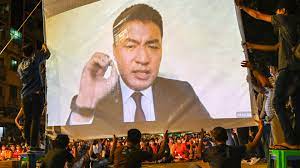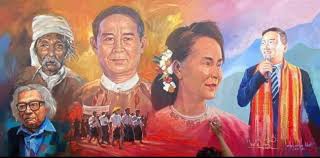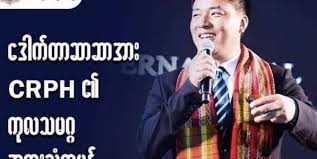
Nigel Adams MP
Minister of State for Asia
King Charles Street
London
SW1A 2AH
Tel: 0207 008 5000
The Lord Alton of Liverpool
House of Commons
London
SW1A 0AA
www.gov.uk/fcdo
02 June 2021OFFICIAL
Dear Lord Alton,
Thank you for your email of 13 May which attached a copy of the address by Dr Sasa to UK Parliamentarians.
The UK Government condemns the military coup in Myanmar, the violence against the people of Myanmar and the detention of members of the civilian government and civil society, including State Counsellor Aung San Suu Kyi and President Win Myint. The UK is a champion of the rules based international order and democratic governance.
We are calling for: an end to the coup; revocation of the state of emergency; the immediate release of all those arbitrarily detained; unobstructed humanitarian access; the protection of rights and freedoms; the peaceful reconvening of the elected National Assembly; and respect for the results of the 2020 Election.
Immediately after the coup, the UK announced a rapid review of all UK aid spending in Myanmar. The review determined that the UK should continue to stand with the people of Myanmar, but we should not give political credibility to the military regime. UK aid will now focus on three objectives: (i) meeting humanitarian needs and supporting the resilience of the most vulnerable; (ii) protecting access to basic health, education, food security and (iii) nurturing the roots of a more open and inclusive society.
Dr Sasa’s statement emphasised four key areas of humanitarian concern: food security, health, education and shelter. The UK is strongly committed to helping those most in need in Myanmar including supporting these priority areas. We are continuing to provide humanitarian support, life-saving health services and basic education to some of the most vulnerable and conflict-affected populations. We are also working closely with civil society to help build the resilience of communities and the foundations for a more open, inclusive and democratic Myanmar.
UK aid provides life-saving humanitarian assistance to around 460,000 conflict affected and displaced people in Myanmar and on the Thai border. We have a large humanitarian and resilience programme in Myanmar (around £28 million planned for this financial year). Since the coup, we have provided £5.5m in new humanitarian funding for the Red Cross, UN, and local and International NGOs. We have also reprioritised £2.4m of humanitarian funding towards urgent needs in Kachin, Rakhine
and Karen States.
We are concerned about the impact of fighting on civilian populations. Both I, and the UK Ambassador to Myanmar, have strongly condemned the recent attacks on civilians by the military in Chin State.
The Myanmar humanitarian programme includes work along the Thai Border, and support in Rakhine, Chin, Kachin, Karen, Kayah and Northern Shan. We provide support through a range of partners including Danish Church Aid, The Border Consortium, Joint Strategy Team partners and Health Poverty Action (HPA) to reach highly vulnerable people.
Reaching displaced people often includes working cross border because of security and access constraints and we provide such assistance in Kachin, Karen and Kayah states. We are closely monitoring the impact of the recent military coup including supply routes to ensure this support reaches those in most need.
The UK is also one of the largest and longest-running bilateral donors in the health sector in Myanmar and continues to support Myanmar through this difficult time. As a leading donor to the Access to Health Fund, the UK continues to protect access to basic health services for the most vulnerable and provide life-saving service delivery in health.
UK support is focused on the most vulnerable, including those population in ethnic areas. Following the coup, we have closed support for educational policy reforms and are focusing on support for ethnic areas and non-formal education. We are exploring options for remote learning.
The NUG’S commitment to protect, promote and respect the rights, dignity and quality of life of ethnic communities is one we wholly support. The UK remains strongly committed to helping those most in need in Myanmar. We will continue to provide humanitarian support to the Rohingya and other vulnerable and conflict-affected populations. We are in close contact with networks on the ground in Rakhine to monitor risks of atrocities, human rights violations and deterioration in the humanitarian and health situation in camps and villages. We will continue to raise the plight of the Rohingya on the international stage.
We welcome the formation of the NUG to push for an inclusive, democratic future for Myanmar. The NUG are an important voice for many in Myanmar. On 9 April, the UK convened an Arria-formula meeting at the UN to discuss the issue of Myanmar and invited Daw Zing Mar Aung, from the NUG, to address participants. On 20 April, I met with Dr Sasa, and reiterated the UK’s support for his ambitions for an inclusive, democratic future for Myanmar.
Alongside this, the UK has led a strong, coordinated international response, including through our G7 Presidency and our leadership role on Myanmar at the UN Security Council. On 10 March, the UK secured a Presidential Statement at the UN Security Council which condemned the violence against peaceful protestors. On 12 February and 24 March we secured strong consensus resolutions at the UN Human Rights Council. We secured G7 statements on 3 and 23 February, as well as a strong statement on Myanmar on 5 May, in the G7 Foreign and Development Minister’s communiqué. I have met the United Nations Special Envoy to Myanmar and the UN Special Rapporteur on the situation of Human Rights in Myanmar to discuss the situation and how to ensure a coordinated and impactful international response.
The UK, in conjunction with partners including the US and Canada, have announced targeted sanctions against the regime. On 17 May, the UK sanctioned Myanmar Gems Enterprise (MGE), which is a key source of revenue for the junta. These sanctions are the first under the new Myanmar sanctions regulations laid in parliament on 29 April.
They demonstrate the UK’s commitment to targeting the military junta’s funding streams to put pressure on them to immediately end the coup. These sanctions follow the designations of nine high-ranking military officials and the two key military linked conglomerates. The UK will consider all tools at its disposal, including further sanctions targeted against those responsible for undermining democracy and repressing the civilian population
The UK is also engaging with a range of partners globally and in the region. The Foreign Secretary and I have spoken to a wide range of counterparts, including the US, France, Germany, Australia, New Zealand and Japan. We have also engaged with partners in ASEAN, including with the ASEAN Secretary General, to seek a strong and coordinated response. We welcome ASEAN’s recent Five Point plan, and strongly agree on the need for dialogue and an end to the violence. The military must implement it without delay.
Nigel Adams MP
Minister of State for Asia





